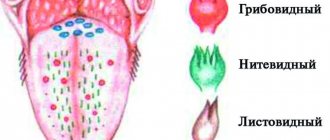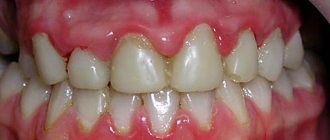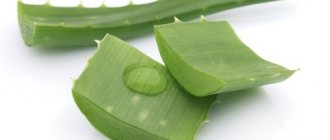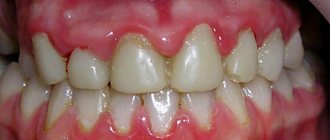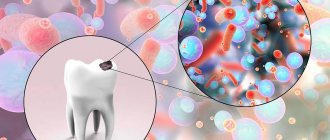Plaque on the tongue: normal or not?
The human language is a kind of litmus test for the health of the entire organism. Normally, a healthy person should have a tongue without plaque, but this is ideal, which is rare today. If the tongue is coated, there are only two cases where you should not worry about it.
- After meal.
Eating foods such as strong tea, black coffee, red wine, blueberries, and beets causes temporary staining of the tongue and an unnatural coating on it, but both phenomena go away on their own and do not cause damage to health. - After the night.
A constant coating on the tongue in the morning is normal. At night, bacteria living in the mouth actively multiply, leaving traces of their vital activity. A thorough morning toilet will put everything in its place.
Tongue care kit from miradent.
Prevention
Dark spots on the tongue will never bother you if you follow the following rules and recommendations:
- Minimize the consumption of spicy, fatty, carbonated water, coffee.
- Maintain good oral hygiene. In addition to teeth, clean the inside of your cheeks, gums, and tongue. Teach children to this. Use plant extracts for rinsing. Don't skimp on toothpaste.
- Get rid of bad habits: smoking and alcohol abuse.
- When treating with antibacterial compounds, strictly follow medical recommendations.
- Expand the amount of physical activity in accordance with age and health status.
- Add bran, fruits, and vegetables to the menu. Nutritious smoothies are beneficial. Instead of black tea, drink mint, strawberry, linden or other herbal tea.
- If you are prone to sore throat, try not to injure the mucous membrane of the throat, for which purpose eat dishes in the form of puree. Inhalation is carried out using sea buckthorn or fir oil.
- If a child’s tongue turns black, consult a pediatrician to find out what new food triggered such a symptom, so that you can then help the child adapt painlessly. Treatment methods for children do not differ from those for adults. Great care and smaller dosages will be required, as determined by your doctor.
- Baby food should be natural and consist of fresh products. On the recommendation and under the supervision of a pediatrician, vitamin and mineral complexes can be given to the child to strengthen the immune system.
Do not practice self-medication, which rarely ends well. If the condition worsens, immediately contact a doctor. Regularly visit an ENT doctor, dentist and other specialists for preventive purposes. Bitter salt for cleansing the intestines, you can find out at the link.
What if it's a disease?
A strong coating on the tongue and bad breath are already a reason to be wary. An experienced doctor will determine which disease the plaque on the tongue is a sign of, comparing the degree of density of the deposit, color and location.
Glossitis
One of the typical diseases characterized by plaque on the tongue is glossitis - inflammation of the tongue caused by injury or of an infectious nature. With glossitis, red spots appear on the tongue, which is why the disease is sometimes called “geographic tongue.” Read more in the article.
Gastritis
If your mouth is sour and there is a coating on your tongue, this is a sign of inflammation of the gastric mucosa. Usually the plaque disappears if you follow a diet.
Thrush
With thrush, the plaque is located under the tongue. It is distributed unevenly and has the character of spots.
Chlamydia
With chlamydia, a sexually transmitted disease, a thick, sticky coating appears on the roof of the mouth and tongue as a result of a malfunction in the immune system after an attack by chlamydia.
Bronchitis and pneumonia
Plaque on the sides of the tongue will indicate an upper respiratory tract disease. In most cases, it is whitish and is easily removed by brushing your teeth and tongue, but also quickly returns to its original place.
Alcoholism
A coating on the tongue after alcohol abuse is common. People talk about this figuratively: “It’s like cats have shit in your mouth.” However, in chronic alcoholics, the dark brown coating never goes away and is localized at the root of the tongue.
Cancer
If the tongue is coated, one cannot say with certainty that a specific type of cancer is present. But it is precisely this symptom, coupled with a number of other characteristics, that indicates a complication of an oncological disease (for example, a malignant tumor in the lungs).
Plaque on the tongue of a pregnant woman, with rare exceptions, is not a sign of illness - it is the result of changes in hormonal levels.
How to get rid of plaque and prevent it? TOP methods
Before you start getting rid of plaque, you should determine the exact cause of the phenomenon. White-yellow plaque can be eliminated using regular hygiene procedures:
- proper brushing of teeth and tongue. After brushing the surface of the teeth, you should make several longitudinal movements from the base of the tongue to the end to clean the receptor organ from the plaque that has formed. This should be done not only in the morning, but also in the evening to eliminate food residues;
- use of antibacterial rinses and sprays. It is worth using the mentioned products between meals: they allow you not only to freshen your breath, but also to eliminate some of the bacteria. Such rinses and sprays are especially relevant when it is not possible to perform full oral hygiene;
- use of an irrigator. The device allows you to maintain healthy microflora in the mouth due to its ability to remove food debris and deposits in hard-to-reach places, including periodontal pockets. An indispensable device when wearing braces, as well as for patients with crowns and implants;
- professional cleaning by specialists. Regular hygiene and prevention in the dental clinic will avoid the development of oral diseases and prevent unwanted accumulation of microorganisms in the oral cavity. Hygienic cleaning of the oral cavity in the dentist’s office will not only help get rid of plaque on the tongue, but will also save you from dental plaque, whitening your smile by 1-2 shades.
A separate group of methods for getting rid of whitish plaque includes traditional medicine. Among the most effective of them:
- rinsing with infusions and decoctions of medicinal plants. Herbs such as mint, sage, chamomile, and eucalyptus have performed well in this matter. These plants can be bought at the pharmacy (in dry form). Rinsing with herbal decoctions will get rid of the film and prevent gum disease;
- rinsing with vegetable oil. You should prepare 1-2 tbsp. l. vegetable oil and rinse your mouth with it for several minutes. The effect will be similar to the action of an absorbent, which absorbs all harmful components. After rinsing, the mouth should be rinsed with running water;
- resorption and chewing of propolis pieces. This natural disinfectant will reduce the number of bacteria in your mouth;
- rinsing with a weak solution of salt and soda. Such compositions help cleanse the oral cavity of food debris after eating. Rinsing takes 2-3 minutes.
If there is a suspicion that pathology is the cause of plaque formation, it is necessary to begin comprehensive treatment, which will be aimed at eliminating the provoking factor. The above methods of dealing with an unpleasant phenomenon are used as supportive ones.
Main causes of plaque
- Infection.
The main cause of plaque on the tongue in adults is infectious diseases, characterized by the uncontrolled proliferation of pathogenic microorganisms. - Impaired immune function.
When the body's protective barrier cracks, this serves as a catalyst for the activation of pathogenic bacteria, which usually occurs against the background of an increase in body temperature. - Gastrointestinal pathologies.
Various chronic ailments of the gastrointestinal tract caused by Helicobacter. Plaque on the tongue due to gastritis, if the disease is not treated, becomes denser over time and provokes bad breath. A clear sign of enterocolitis in adults is considered to be plaque on the root of the tongue. - Side effect of drugs.
Plaque on the tongue after antibiotic treatment is a common phenomenon. Medicines that include substances that inhibit the growth of certain pathogenic bacteria negatively affect the acid-base balance in the mouth, which entails an increase in the number of microorganisms “responsible” for the appearance of plaque. - The consequences of nicotine.
If you are an “experienced” smoker, then you shouldn’t be surprised by a gray or yellow coating on your tongue. Nicotine abuse has a detrimental effect on the microflora of the body in general and the oral cavity in particular.
Attention!
A provoking factor for the appearance of plaque on the tongue is also helminthic infestations, such as giardiasis. For differential diagnosis in this situation, it is necessary to take a stool test for helminth eggs.
What about your taste buds?
On the surface of the tongue there are thousands of small pimples - these are papillae. All of them can be divided into 6 groups, each of which plays its own role, including the ability to distinguish four basic tastes: sweet, salty, bitter and sour.
Interestingly, over time, taste buds “wear out,” but if a person is healthy, they are replaced by new “pimples.” At a young age, this process occurs quite quickly, and after 45 years, as a rule, it slows down.
Best materials of the month
- Coronaviruses: SARS-CoV-2 (COVID-19)
- Antibiotics for the prevention and treatment of COVID-19: how effective are they?
- The most common "office" diseases
- Does vodka kill coronavirus?
- How to stay alive on our roads?
Therefore, with age, a person ceases to distinguish tastes and aromas so keenly. But sometimes the inability to taste food is not just due to age. Loss of sensitivity in taste buds may be a symptom of a bacterial infection in the digestive tract or indicate problems with the pancreas.
What does plaque color tell you?
White
As we have already said, a thin white mucous coating on the tongue after sleep is not a deviation from the norm. A white coating of increased density indicates constipation, and a cheesy coating on the tongue indicates the unhealthy activity of yeast-like fungi of the genus Candida.
Yellow
A bright yellow coating on the tip of the tongue indicates hepatitis A (Botkin's disease). If there are problems in the functioning of the gallbladder, a yellowish coating and cracks appear on the tongue.
Dark
A dark coating on the tongue is a sign that something is wrong with the lungs. You don’t often see a completely black plaque: for example, in advanced stages of cholera due to dehydration of the body or in Crohn’s disease.
Language is an indicator of well-being
The doctor’s request “Show your tongue!” is the most common one during any examination. The language can be used to judge the condition of many human organs. In this case, any changes in the structure, shape or size of the tongue are important: color, presence of grooves, degree of smoothness, condition of the papillae, mobility, humidity and density.
If a coated tongue can still be explained by diseases of the throat or digestive organs, then a black coating on the organ can terrify anyone. What reasons can provoke such manifestations of the body?
What to do?
How to remove plaque from the tongue? To begin with, determine exactly the reason why the plaque occurs and treat the underlying disease by following the doctor’s instructions. For preventive purposes, in order to minimize the amount and density of plaque, you must follow simple rules of personal hygiene:
- brush your teeth in the morning and before bed with toothpaste and a brush that has a tongue cleansing pad;
- use antibacterial mouthwash;
- use a special spoon to clean the tongue, moving from its periphery to the front surface.
For a detailed article on how and how to properly clean your tongue from plaque, read a separate article.
How to treat black tongue
Complete elimination of a symptom depends on the source of its occurrence. This is what therapy is aimed at, including various methods, such as:
- Compliance with a special diet if the cause of plaque is gastrointestinal pathology.
- Medicines to combat inflammation, pathogenic bacteria and associated symptoms.
- Physiotherapy.
- Folk remedies.
- Surgical intervention in difficult situations when other treatment methods have proven ineffective.
Effective formulations include tinctures and decoctions for rinsing the mouth. They are based on the following medicinal plants;
- Linden;
- oregano;
- yarrow;
- chamomile;
- plantain;
- oak bark;
- mint;
- sage;
- strawberries;
- flax seeds.
Map of diseases of internal organs by language
Scientists believe that the tip of the tongue is connected to the heart, the central part - to the stomach and pancreas, the back part - to the kidneys, the right lobe of the tongue - to the spleen and right lung, the left - to the liver and left lung. If strong changes occur in any area, it means there are problems with one or another organ.
This map will help you identify tongue disease by color and location.
Redness:
- at the base - impaired renal function;
- in the middle - diseases of the colon;
- at the tip - problems with the cardiovascular system;
- front part - weak lungs, breathing problems;
- the central part is stomach diseases.
Small cracks located throughout the entire area of the mucosa appear with intestinal diseases.
Changes in the fold in the middle of the organ:
- transformation of shape - problems with the spinal column;
- deviation of the fold to the right - back pain;
- deviation to the left – displacement of the cervical vertebrae;
Trembling in the tongue may indicate severe stress or a disorder of the nervous system.
When diagnosing diseases by the color of the tongue, additional symptoms should be taken into account, since the same shade of the tongue characterizes both problems that do not require serious intervention and diseases that require immediate hospitalization.
What to look for when examining your tongue
An adult brushes his teeth every day. The same mandatory rule for any person should be a daily inspection of the tongue.
When examining the tongue, it is important to pay attention to its:
- color;
- plaque;
- surface structure;
- mobility;
- symmetry;
- the appearance of bubbles, pimples, spots and other inclusions.
If a black coating appears on your tongue, it is also important to remember other symptoms:
- past illnesses or stress;
- temperature increase;
- drug treatment;
- consumption of alcohol, nicotine, etc.
